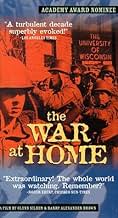Interviews with people involved with and leading the Madison, Wisconsin area resistance to the Vietnam war.Interviews with people involved with and leading the Madison, Wisconsin area resistance to the Vietnam war.Interviews with people involved with and leading the Madison, Wisconsin area resistance to the Vietnam war.
- Nominated for 1 Oscar
- 3 nominations total
Spiro Agnew
- Self - White House Conference, Beside Connally
- (archive footage)
- (uncredited)
William Bablitch
- Self - Law Student, Observer
- (archive footage)
- (uncredited)
John Connally
- Self - White House Conference, Beside Agnew
- (archive footage)
- (uncredited)
Ngo Dinh Diem
- Self - with Nixon in Vietnam
- (archive footage)
- (uncredited)
John Ehrlichman
- Self - White House Conference
- (archive footage)
- (uncredited)
Dwight D. Eisenhower
- Self - Discusses Domino Theory
- (archive footage)
- (uncredited)
Featured review
There are a number of films out on the anti-war movement. Some, like the recent 'Weather Underground' never really explain the historical context or the protester's politics, but just stay at the surface of personality and sensational subject matter. Others, like Berkeley in the Sixties, take a completely nostalgic view, embalming leftist politics as something cool boomers did in a now inaccessible past when they were crazy kids. The War at Home, though fills in the background, takes the politics seriously, and imagines that it might be actually worth something to the viewer. While the film is focused on events in Madison, WI, it's interest is by no means limited to folks with experience of that time or place. It's very effective microcosm of the larger movement. While the film has a fairly conventional talking-head-and-archival-clip form, it's well made and engaging. It also has no pretense to 'objectivity,' which is a good thing. A number of observers trace the decline of the anti-war movement to a turn towards violence that alienated more moderate folks who were beginning to question the war after Tet. the first signal event in this supposed turn toward the dark side was a bombing on the University of Wisconsin campus, which becomes the central event in this film. A grad student in science was killed in the blast, and there was great hue and cry that anyone would set off a bomb amidst the seat of higher learning. However, rather than simply casting the bombers as villains, the film seeks to understand their actions, and ultimately sympathizes with them. Rarely do we ever see this -- political radicalism treated as human and comprehensible -- and for presenting the side of the argument we never hear otherwise, The War at Home is a valuable and all too rare document.
Storyline
Did you know
- TriviaThis film has a 100% rating based on 5 critic reviews on Rotten Tomatoes.
- ConnectionsEdited into American Pop (1981)
Details
- Runtime1 hour 40 minutes
- Color
- Sound mix
Contribute to this page
Suggest an edit or add missing content

























